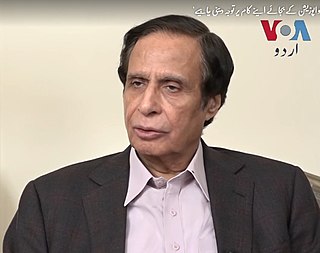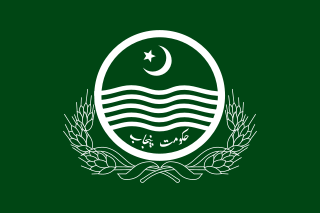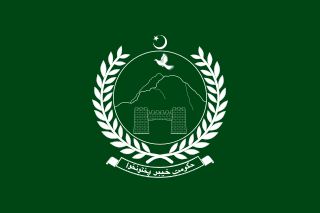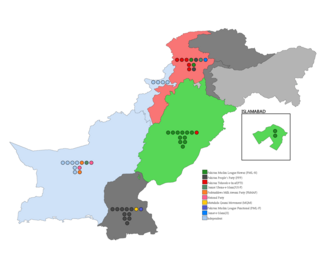
The President of Pakistan, officially titled the President of the Islamic Republic of Pakistan, is the ceremonial head of state of Pakistan and the commander-in-chief of the Pakistan Armed Forces.

The prime minister of Pakistan is the head of government of the Islamic Republic of Pakistan. Executive authority is vested in the prime minister and his chosen cabinet, despite the president of Pakistan serving as the nominal head of executive. The prime minister is often the leader of the party or the coalition with a majority in the lower house of the Parliament of Pakistan, the National Assembly where he serves as Leader of the House. Prime minister holds office by virtue of their ability to command the confidence of the National Assembly. The prime minister is designated as the "Chief Executive of the Islamic Republic".

The chief justice of Pakistan is head of the court system of Pakistan and the chief judge of the Supreme Court of Pakistan. The officeholder is the senior most of 17 senior justices of the Supreme Court of Pakistan.

The Pakistan Tehreek-e-Insaf is a political party in Pakistan. It was founded in 1996 by Pakistani cricketer-turned politician Imran Khan, who served as the country's prime minister from 2018 to 2022. The PTI is one of the three major Pakistani political parties alongside the Pakistan Muslim League–Nawaz (PML–N) and the Pakistan People's Party (PPP), and it is the largest party in terms of representation in the National Assembly of Pakistan since the 2018 general election. With over 10 million members in Pakistan and abroad, it claims to be the country's largest political party by primary membership as well as one of the largest political parties in the world.

The Government of Pakistan constitutionally known as the Federal Government, commonly known as the Centre is the national government of the Islamic Republic of Pakistan, a federal parliamentary democratic republic consisting of four provinces, two autonomous territories, and one federal territory. Under the Constitution, there are three primary branches of a government: the legislative, whose powers are vested in a bicameral Parliament; the executive, consisting of the President, aided by the Cabinet which is headed by the Prime Minister; and the judiciary, with the Supreme Court.

Chaudhry Pervaiz Elahi is a Pakistani politician who is the former Chief Minister of Punjab when he, as Chief Minister, had dissolved the Assembly. He had been a member of the Provincial Assembly of the Punjab from August 2018 till January 2023. In 2023, he left the Pakistan Muslim League (Q) and joined Pakistan Tehreek-e-Insaf (PTI) and was appointed its president along with his son, Moonis Elahi, and other ten former PML(Q) MPAs over political rifts with the party president, Chaudhry Shujaat Hussain. He was the former president of the Punjab Division of the PML(Q).

The Provincial Assembly of the Punjab is a unicameral legislature of elected representatives of the Pakistani province of Punjab, which is located in Lahore, the provincial capital. It was established under Article 106 of the Constitution of Pakistan, having a total of 371 seats, with 297 general seats, 66 seats reserved for women and 8 reserved for non-Muslims. The 17th Provincial Assembly of the Punjab was dissolved prematurely on 14 January 2023. The date of next elections in Punjab is being highly contested legally. The Constitution of Pakistan requires that new elections for the Punjab Assembly must be held within 90 days from the date of dissolution under Article 224(3)(a). Therefore, by law, new elections for the Punjab Assembly must have been held by 14 April 2023. However, the Election Commission of Pakistan had unilaterally announced that the province was set to elect a new legislature on 14 May 2023. After that date's passing, it is unclear when provincial elections will be held.

The Provincial Assembly ofKhyber Pakhtunkhwa is a unicameral legislature of elected representatives of the Pakistani province of Khyber Pakhtunkhwa, which is located in Peshawar, the provincial capital. It was established under Article 106 of the Constitution of Pakistan, having a total of 145 seats, with 115 general seats, 26 seats reserved for women and 4 reserved for non-Muslims. The 11th Provincial Assembly of the Khyber Pakhtunkhwa was dissolved on 18 January 2023, and the province is set to elect a new legislature on 8 October 2023.

Ashtar Ausaf Ali is a Pakistani lawyer who twice served as the Attorney General for Pakistan from 2016 to 2018, and from 2022 to 2023. In his first term, he co-drafted the Twenty-Fifth Amendment to the Constitution of Pakistan, which merged the Federally Administered Tribal Areas with Khyber Pakhtunkhwa.

Chaudhry Moonis Elahi is a Pakistani politician from Punjabi Jatt Warraich family, who had been a member of the National Assembly of Pakistan frim October 2018 till August 2023. He was the Minister for Water Resources from 13 July 2021 till 10 April 2022 when the no-confidence motion against Imran Khan succeeded. Previously, he was a member of the Provincial Assembly of the Punjab from 2008 to May 2018.

Mian Muhammad Hamza Shahbaz is a Pakistani politician, who was the Leader of the Opposition in the Provincial Assembly of Punjab, in office since 20 October 2022. He also served in this position from September 2018 to April 2022. He was also the Chief Minister of Punjab from 30 April 2022 to 02 May 2022. He had been a member of the Provincial Assembly of Punjab from August 2018 till January 2023. Previously, he was a member of the National Assembly of Pakistan from June 2008 to May 2018. He is the eldest son of current Prime Minister Shehbaz Sharif.

The triennial Senate Electionsof Pakistan were held on 3 March 2018 to replace 52 retiring senators - half of the Senate's strength - with the winning candidates serving six-year terms. Overall, Pakistan Muslim League (N) came out as the largest party, followed by the Pakistan Peoples Party and the Pakistan Tehreek-e-Insaf. The results of these elections were steeped in controversy due to rampant allegations of horse trading and vote-buying, which lead to the Prime Minister and opposition leader Imran Khan calling for reforms. Prior to this election, PML (N) candidates were declared as independents by the Election Commission of Pakistan owing to a Supreme Court judgment.

Sami Ullah Baloch v. Abdul Karim Nousherwani is a landmark decision by the Supreme Court of Pakistan in which the Court unanimously held that electoral disqualification under Article 62(1)(f) of the Constitution of Pakistan was for life. The ruling barred former Prime Minister of Pakistan Nawaz Sharif from holding public office indefinitely, following his disqualification in the Panama Papers case in 2017. It is also noted as the last case conducted by human rights lawyer Asma Jahangir before her death.
Umar Ata Bandial is a Pakistani jurist who is currently serving as the 28th outgoing Chief Justice of Pakistan. His appointment as the new Chief Justice was approved by President Arif Alvi on 13 January 2022, after which he assumed his office on 2 February 2022.
A political and constitutional crisis emerged in Pakistan from, 3 April 2022 to 10 April 2022 when, National Assembly's Deputy Speaker Qasim Khan Suri dismissed a no-confidence motion against Prime Minister Imran Khan during a session in which it was expected to be taken up for a vote, alleging that a foreign country's involvement in the regime change was contradictory to Article 5 of the Constitution of Pakistan. Moments later, Khan stated in a televised address that he had advised President Arif Alvi to dissolve the National Assembly. Alvi complied with Khan's advice under Article 58 of the constitution. This resulted in the Supreme Court of Pakistan (SCP) taking a suo motu notice of the ongoing situation, creating a constitutional crisis, as effectively, Imran Khan led a constitutional coup. Four days later, the SCP ruled that the dismissal of the no-confidence motion, the prorogation of the National Assembly, the advice from Imran Khan to President Arif Alvi to dissolve the National Assembly, and the subsequent dissolution of the National Assembly were unconstitutional, and overturned these actions in a 5-0 vote. The Supreme Court further held that the National Assembly had not been prorogued and had to be reconvened by the speaker immediately and no later than 10:30 a.m. on 9 April 2022.
Chouhdary Omer Sarfraz Cheema is a Pakistani politician belonging to Pakistan Tehreek e Insaf. He has been a founding member of PTI. He served as the 42nd Governor of Punjab from 3 April 2022 to 10 May 2022 and was appointed by Imran Khan. He was removed as Governor and replaced by Muhammad Baligh Ur Rehman on 30 May 2022, with approval from the President of Pakistan. He was later appointed as Advisor to the Chief Minister of Punjab on Information by Chaudhry Pervaiz Elahi. He was further appointed as Advisor to the Chief Minister on Home and Prisons. He ceased to hold both offices on 14 January 2023.

By-elections were held in Punjab, Pakistan on 17 July 2022 to elect 20 members of the Provincial Assembly of the Punjab. The Pakistan Tehreek-e-Insaf won a landslide victory on 15 of those 20 seats, leading to the collapse of Chief Minister Hamza Shahbaz's PML(N)-led coalition government, as it became 7 seats short of a majority.

Provincial elections were scheduled to be held in the Pakistani province of Punjab in May 2023, according to the Supreme Court of Pakistan's most recent judgement, to elect a new provincial legislature.

Irfan Qadir is a Pakistani lawyer, jurist and the current Special Assistant to the Prime Minister on Legal Reforms since 15 December 2022. He previously served as the 29th Attorney-General for Pakistan from April 2012 to June 2013. He also served as a judge of Lahore High Court in 2009.
Shehzad Ata Elahi is a Pakistani lawyer who was the Attorney General of Pakistan from February 2023 to March 2023. He has expertise in various areas of law.













